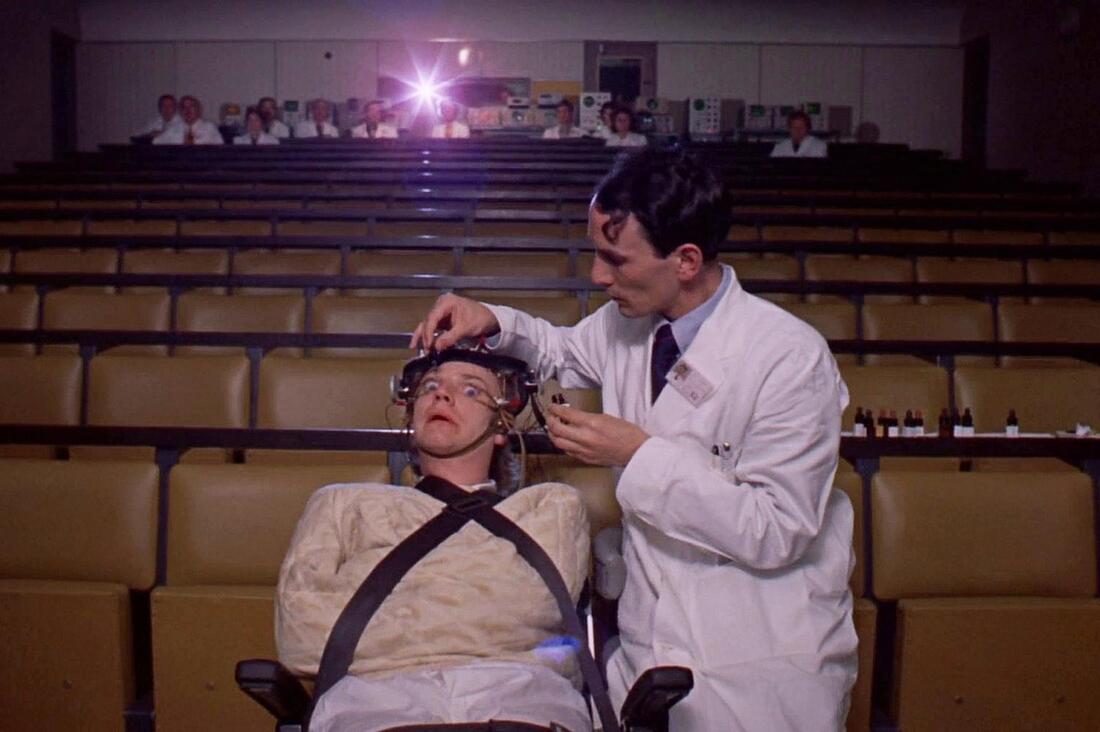 "Hanging on in quiet desperation is the English way". -Pink Floyd Cue the Moog Synthesizer compositions of Wendy Carlos. In 1971 Kubrick released a masterpiece Social Commentary on a Crumbling Britain, and a social/psychological experiment adapted from the Anthony Burgess Novel A Clockwork Orange, ("the American edit"). As the adaptation progressed, Burgess and Kubrick got on swimmingly with similar tastes, philosophies, and literary interests. While Burgess only made $500. from the Film, one thing they had in common was their fascination with Napoleon Bonaparte. The Seminal Dystopian novel chronicles a near-future lawless British teen through his crime sprees, and then a B.F. Skinner'esque psycho-social modification, called the Ludavico Treatment. The 'Ludovico Treatment' promised to cure 'Little Alex' of his penchant for lawless "Ultra-Violence", in no time. And so it was either the treatment or prison. The American and future distributions of the Book would leave out the final chapter/s proving his redemption. Not surprisingly the Book, and the Film polarized audiences, but mostly because it seemed tangibly real -- Possible. And so we know that the novel and film were good, because they forced followers to the bleeding edge of their comfort zone. As we drift toward future Dystopian Britain, with their charismatic leader, I wonder how his behavior mods went whilst, 'in Hospital'. I think that A Clockwork Orange was an amazing book, and I have read & seen it many times. You could say I'm a fan..., But, I never knew watching why the eye-dropper scenes of "ultra-violence", weren't in the book. It turns out that Malcom McDowell scratched his cornea on set, became blind for a spell, and the shots with the eye-dropper were an actual physician treating him. Fun Fact! This doctor visit was a clever directorial turn in production, which intensified, the peak. The audience shuddered to see their anti-hero endure ‘treatment’. But for me the “Boris Moment” came earlier, when Alex is visited by his Probate Officer. You see, I keep seeing Boris Johnson as probation officer P.R. Deltoid, sitting beside truant lil' Alex mid-day on his bed. In this fateful scene he's being told by Mr. Deltoid that his days are numbered. There is this slivered implication that our Hero's destiny could maybe be adjusted before his fate is sealed... But for recklessness on both sides, the outcome is certain, and the writing was on the wall. Regardless — At that decisive moment, when Alex is un-phased by the ovations of Mr. Deltoid (AKA Boris) — His maniacal Napoleonic chaperone now shouting, presses Alex to the mattress and grabs his crotch. (Exhale now as this is perhaps the end of a stretch to tie Boris to the script, however the image persists). Now I know that The P.M. is not Mr. Deltoid, but one can wonder how far from this character he is. Of course analogs exist to anything if you stretch the facts and blur the lines. Mr. Deltoid doesn't know the outcome, so he comes with an ultimatum of sorts, and Alex believes his destiny is otherwise. I suppose the lesson here is one of Hindsight. When history is written, it is always by the winner. Outcomes are never assured, and the social experiment of the Ludovico treatment, as with a lobotomy, much like Brexit, wont necessarily put you (as they say) on the right side of history. Ludavico was an experimental aversion therapy to rehabilitate criminals into useful lawful citizens in under two weeks. (and when it sounds too good to be true...) It should come as no surprise that the real actor Aubrey Morris, who played Mr. Deltoid, also played Napoleon. This is not to implicate Boris is "acting" as P.M. nor as Napoleon. One truth remains, that when Boris got the plague, and the fever came, and his O2 levels tanked, he saw perhaps for the first time the back-side of his own black mirror. When the shot resolved, he got to contemplating, but for a minute, "What If"? The thing about the psychopathically self-assured is that they almost never have the opportunity to put on another pair of lenses. And the trouble with a lobotomy, is that it does work for some things, but history doesn't smile upon the treatment any longer. When we elect a single person to represent "us" in more than one thing... Can we be assured that they are capable of multitasking, or even competent at two things? Here, we have Brexited --That's the one thing. And here is this hushed moment, like the crotch grab -- We hold our breath, then... the "hut--hut--hike"!, and then the snap, the kick, and alas the ball is high in the air floating back down to the earth, and where it lands will decide the fate of the game. But it's not a game. As we all seek a treatment, it's perhaps prudent to remember that maybe we were all wrong. That our collective Ludavico treatment will later be recalled as a lobotomy, we wont know today, and so we punt. So we are back home in Boris' cozy bedroom, after a nice day's romp with some masked friends far afield, and we return as fast as we left to our agendas. The question is; Did being hospitalized serve as a negative operant, in this classic Behavior Mod. drama? There is one way to look at our reactions to the dystopia, and it is always political. How does this affect electability? When there are no adults in the room, do the kids step up and make things work, or do they run amuck? It is the case that some want to try a strategy to stave political fall-out and prevent casualties, which sounds like a reasonable way to remain in power. The other is to let a wildfire burn the brush back, hoping the forest stands, and fills back in more lush than before. Neither is ever really wrong in the moment, per se', but judged harshly for certain through hindsight when they fail. Through the lens of A Clockwork fiction, where Britain is de-stabilized, gangs patrol the night, criminals clash with curfews, and quarantines seem to keep the sanguine safe, while rogues profit by any means necessary, is there really a reason to keep up the façade? Wasn't it always this way? Didn't we always click agree to the terms when we began the game? A few people wield the power, and the rest work for them. Elites scatter scraps, and pittance to keep the masses in check? It is as Feudal as always. sSame as it ever was. Wealthy people like Madonna recite solidarity with commoners from a 300 square meter bath covered in fresh rose petals, while waiters move in with parents & friends and ration ramen & soap. Shall we admire what a great job they are doing? We now have two camps. 1. Governors, States, Provinces, recognize that the emperor has no clothes. Kids decide that because there are no adults in the room, we should pick up the pieces, and put things back together, this way. or 2. People aligned with the misanthrope wait for a rally, handouts, and some loose sense of direction, if not a soup-line. And then we all just go back to doing things the same way all over again, so we can forget. Whichever way you lean, you might as well go for broke. Kubrick wanted a shot of Alex jumping out a window, to commit suicide -- So he dropped a Newman Sinclair Camera in a box out of the third storey window of the Corus Hotel, to grab the effect of falling from Alex's point of view. The camera survived 6 takes, until the shot was perfect. Like any Dickensian tale, redemption only happens when one sees that there is something to recover from. Boris returns from the ICU, and isn't scared shitless? Britain will either recover from a massive hangover by dumb luck, staggering home from the pub, and having a long nappy on the global economic stage, or they will not. But I'm not so sure Boris gets that. In a Clockwork Orange the Book's ending closes the loop on redemption, while the Film version and American abridged printings leave a bit more up in the air. As with all great film and fiction, you are either the type who wants the Hollywood ending, or the Fellini finish. Kubrick asked Malcom McDowell to try the jock-strap on the outside of his Cricket whites, and that made all the difference.
0 Comments
Leave a Reply. |
Age and Treachery will overcome youth and skill. Archives
January 2024
Categories |


 RSS Feed
RSS Feed